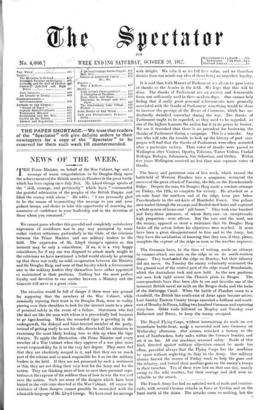The situation would be full of danger if them were
any ground for supposing that the members of the War Cabinet, while nominally reposing their trust in Sir Douglas Haig, were in reality peering over their shoulders to look for the shortest route to a place of personal safety in the event of a failure. Statesmen who feel like that are like the man with whom it is proverbially bad business to go tiger-hunting. When the wounded tiger is growling in the undergrowth, the disloyal and faint-hearted member of the party, instead of getting ready to use his rifle, directs half his attention to examining the most likely looking tree to shin up when the tiger charges. To apply the illustration—the Prime Minister and every member of a War Cabinet when they approve of a war plan must accept responsibility for it to the very last degree. They must feel th-at they are absolutely merged in it, and that they are as much part of the scheme and as much responsible for it as are the military leaders in the field. If they arc not possessed by such in sentiment as this, they are not doing their very best for the Army and for the nation. They are thinking more of how to save their personal repu- tations at theexpense of the soldiers than of bow to win the war and save the nation. Such aro some of the dangers which have been hinted in the criticisms directed at the War Cabinet. Of course the existence of these dangers cannot possibly be reconciled with the admirable language of Mr. Lloyd George. We have read his message with delight. We take it at its full fees value, and we therefore dismiss from our minds any idea of there being an imperfect loyalty.


































